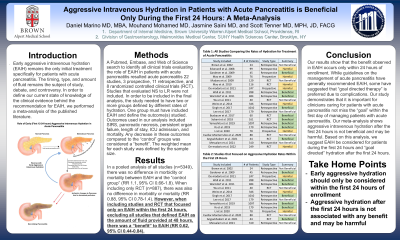Back


Poster Session A - Sunday Afternoon
Category: Biliary/Pancreas
A0014 - Aggressive Intravenous Hydration in Patients With Acute Pancreatitis Is Beneficial Only During the First 24 Hours: A Meta-Analysis
Sunday, October 23, 2022
5:00 PM – 7:00 PM ET
Location: Crown Ballroom

Has Audio

Daniel Marino, MD, MBA
Warren Alpert Medical School of Brown University
Providence, RI
Presenting Author(s)
Daniel Marino, MD, MBA1, Mouhand F. Mohamed, MD, MSc1, Jasmine Saini, MD2, Scott Tenner, MD, MPH, JD, FACG3
1Warren Alpert Medical School of Brown University, Providence, RI; 2Mayo Clinic, Rochester, MN; 3State University of New York, Brooklyn, NY
Introduction: Early aggressive intravenous hydration (EAIH) remains the only initial treatment specifically for patients with acute pancreatitis. The timing, type, and amount of fluid remains the subject of study, debate, and controversy. In order to define our current state of knowledge of the clinical evidence behind the recommendation for EAIH, we performed a meta-analysis of the published literature.
Methods: A Pubmed search to identify all clinical trials evaluating the role of EAIH in patients with acute pancreatitis resulted acute pancreatitis 25 studies, 17 prospective, 18 retrospective, 13 randomized controlled clinical trials (RCT). Studies that evaluated NS to LR were not included. In order to be included in the final analysis, the study needed to have two or more groups defined by different rates of hydration. One group must have included EAIH and define the outcome(s) studied. Outcomes used in our analysis included SIRS, pancreatic necrosis, persistent organ failure, length of stay, ICU admission, and mortality. Any decrease in these outcomes compared to the “control” groups was considered a “benefit”. The weighted mean for each study was defined by the sample size.
Results: In a pooled analysis of all studies (n=1865), there was no difference in morbidity or mortality between EAIH and the “control group” (RR 1.1, 95% CI 0.66-1.8). When including only RCT (n=987), there was also no difference in morbidity or mortality (RR 0.88, 95% CI 0.78-1.4). However, when including studies and RCT that focused only on EAIH within the first 24 hours, excluding all studies that defined EAIH as the amount of fluid provided at 48 hours, there was a “benefit” to EAIH (RR 0.62, 95% CI 0.44-0.84).
Discussion: Our results show that the benefit observed in EAIH occurs only within 24 hours of enrollment. While guidelines on the management of acute pancreatitis have generally recommended EAIH, some have suggested that “goal directed therapy” is preferred due to complications. Our study demonstrates that it is important for clinicians caring for patients with acute pancreatitis not miss the “goal” within the first day of managing patients with acute pancreatitis. Our meta-analysis shows aggressive intravenous hydration after the first 24 hours is not beneficial and may be harmful. Based on this analysis, we suggest EAIH be applied to all patients during the first 24 hours and “goal directed” hydration after the first 24 hours.
Disclosures:
Daniel Marino, MD, MBA1, Mouhand F. Mohamed, MD, MSc1, Jasmine Saini, MD2, Scott Tenner, MD, MPH, JD, FACG3. A0014 - Aggressive Intravenous Hydration in Patients With Acute Pancreatitis Is Beneficial Only During the First 24 Hours: A Meta-Analysis, ACG 2022 Annual Scientific Meeting Abstracts. Charlotte, NC: American College of Gastroenterology.
1Warren Alpert Medical School of Brown University, Providence, RI; 2Mayo Clinic, Rochester, MN; 3State University of New York, Brooklyn, NY
Introduction: Early aggressive intravenous hydration (EAIH) remains the only initial treatment specifically for patients with acute pancreatitis. The timing, type, and amount of fluid remains the subject of study, debate, and controversy. In order to define our current state of knowledge of the clinical evidence behind the recommendation for EAIH, we performed a meta-analysis of the published literature.
Methods: A Pubmed search to identify all clinical trials evaluating the role of EAIH in patients with acute pancreatitis resulted acute pancreatitis 25 studies, 17 prospective, 18 retrospective, 13 randomized controlled clinical trials (RCT). Studies that evaluated NS to LR were not included. In order to be included in the final analysis, the study needed to have two or more groups defined by different rates of hydration. One group must have included EAIH and define the outcome(s) studied. Outcomes used in our analysis included SIRS, pancreatic necrosis, persistent organ failure, length of stay, ICU admission, and mortality. Any decrease in these outcomes compared to the “control” groups was considered a “benefit”. The weighted mean for each study was defined by the sample size.
Results: In a pooled analysis of all studies (n=1865), there was no difference in morbidity or mortality between EAIH and the “control group” (RR 1.1, 95% CI 0.66-1.8). When including only RCT (n=987), there was also no difference in morbidity or mortality (RR 0.88, 95% CI 0.78-1.4). However, when including studies and RCT that focused only on EAIH within the first 24 hours, excluding all studies that defined EAIH as the amount of fluid provided at 48 hours, there was a “benefit” to EAIH (RR 0.62, 95% CI 0.44-0.84).
Discussion: Our results show that the benefit observed in EAIH occurs only within 24 hours of enrollment. While guidelines on the management of acute pancreatitis have generally recommended EAIH, some have suggested that “goal directed therapy” is preferred due to complications. Our study demonstrates that it is important for clinicians caring for patients with acute pancreatitis not miss the “goal” within the first day of managing patients with acute pancreatitis. Our meta-analysis shows aggressive intravenous hydration after the first 24 hours is not beneficial and may be harmful. Based on this analysis, we suggest EAIH be applied to all patients during the first 24 hours and “goal directed” hydration after the first 24 hours.
Disclosures:
Daniel Marino indicated no relevant financial relationships.
Mouhand Mohamed indicated no relevant financial relationships.
Jasmine Saini indicated no relevant financial relationships.
Scott Tenner indicated no relevant financial relationships.
Daniel Marino, MD, MBA1, Mouhand F. Mohamed, MD, MSc1, Jasmine Saini, MD2, Scott Tenner, MD, MPH, JD, FACG3. A0014 - Aggressive Intravenous Hydration in Patients With Acute Pancreatitis Is Beneficial Only During the First 24 Hours: A Meta-Analysis, ACG 2022 Annual Scientific Meeting Abstracts. Charlotte, NC: American College of Gastroenterology.
